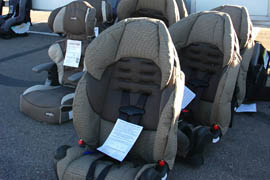Cronkite News has moved to a new home at cronkitenews.azpbs.org. Use this site to search archives from 2011 to May 2015. You can search the new site for current stories.
Bill to require booster seats takes first step in state Senate
PHOENIX – A bill that would require children between the ages of 5 and 8 or who are shorter than 4 feet, 9 inches to ride in booster seats took its first step Wednesday in the state Senate, winning a unanimous endorsement from the Public Safety and Human Services Committee.
Arizona is one of three states that don’t require booster seats despite the National Transportation Safety Board recommending law. Bills to change that have failed repeatedly in previous sessions, but HB 2154, authored by Rep. Nancy McLain, R-Bullhead City, has already won approval by the House.
McLain told the Senate committee that adult seatbelts can injure young children because they don’t fit them properly. Boosters raise the belts to a safe level, she said.
“It’s not an issue of the nanny state coming in and telling parents that they must restrain their child. That’s already in law,” she said. “We’re just telling them that the way we told them to do it before is incorrect.”
Arizona’s current law requires children to be in car seats until age 5 and restrained by seat belts until age 16.
McLain cited Arizona Department of Health Services data showing that of the nine accident fatalities in 2009 involving children between ages 5 and 8, seven of them involved children who weren’t in booster seats. In 2010, she said, all five such fatalities involved children who weren’t in booster seats.
Dr. David Notrica, trauma medical director for Phoenix Children’s Hospital, said that during impact young children can easily slip underneath seatbelts, while the force of the belts can damage intestines and cause spinal injuries.
“What we are currently requiring families to do in the state of Arizona is to put them in adult-type passenger restraint systems,” he said. “That is not the best information that we can be giving the families, and we are doing things that are not in the best interests of the child.”
Dr. Sara Bode, a pediatrician at Phoenix Children’s Hospital, said her job would be easier if McLain’s bill becomes law.
“I think from my standpoint we do a lot of work with trying to educate families every day, but then to not have that backed up by a law frustrates me as a pediatrician because I have a hard time convincing families and telling them the statistics and telling them how important it is,” she said.
Sen. Rich Crandall, R-Mesa, said he was concerned about the possibility that a law would pose an inconvenience for families.
“It’s difficult enough with the infant seat,” he said. “This will allow neighbors to say, ‘Well no, I can’t pick your kids up from school or take them to dance practice because I don’t have an extra booster seat in my car.”
Notrica responded, “I understand it’s an inconvenience, but it’s not too much to ask that people who are not parents appropriately restrain that child when they are going for short trips.”
In the end, Crandall voted for the bill.







